
Sick Man Shows That His Insurance Company Is Prioritizing Wealth Over His Health And Doesn’t Even Hide It
The spread of the coronavirus means that the healthcare system and medical professionals are getting more attention than usual. Lots of people are pointing out the flaws in the system and Twitter user Doctorow is one of them. But this isn’t another coronavirus story.
According to Doctorow, the US has “the worst healthcare in the developed world.” He then explains why using his personal experience with health insurance and how his provider refused to cover the inexpensive medication that he needed. Scroll down to read Doctorow’s story in his own words.
Doctorow’s thread got over 3.4k likes on Twitter and more than 1.1k people retweeted it. The thread also spread to other social media channels, including Imgur where it got over 4.8k upvotes and was viewed by more than 131k users. Scroll down for Bored Panda’s interview with Doctorow about US healthcare and how it can be improved.
Doctorow explained what he went through with his health insurance provider and why, in his opinion, the US has “the worst” healthcare
Image credits: doctorow
Image credits: doctorow
Image credits: doctorow
Image credits: doctorow
Image credits: doctorow
Image credits: doctorow
Image credits: doctorow
Image credits: doctorow
Image credits: doctorow
Image credits: doctorow
A lot of people agreed with the Twitter user’s opinion about how the system in the US needs to be improved. Preferably, by following the fully-functioning example set by other developed countries.
The Atlantic writes that the US has the lowest-performing healthcare system in developed countries, according to the Commonwealth Fund. The highest performing nations are the UK, the Netherlands, and Australia, even though the US spends the most money.
David Blumenthal, president of the Commonwealth Fund, said that this is “consistent across 20 years.” He explained that there are 3 reasons why the US can’t catch up to its allies.
First of all, there’s a lack of insurance coverage: in 2016, over 27 million Americans were uninsured. That’s because they simply can’t afford it. “The literature on insurance demonstrates that having insurance lowers mortality. It is equivalent to a public health intervention,” Blumenthal said.
He also pointed out that the US wastes a lot of money on administration. “Doctors and patients [report] wasting time on billing and insurance claims. Other countries that rely on private health insurers, like the Netherlands, minimize some of these problems by standardizing basic benefit packages, which can both reduce administrative burden for providers and ensure that patients face predictable copayments,” the Commonwealth Fund reports.
Lastly, we have underperforming primary care in the US. “We have a very disorganized, fragmented, inefficient and under-resourced primary care system,” Blumenthal explained. “Many primary-care physicians struggle to receive relevant clinical information from specialists and hospitals. We don’t invest in social services, which are important determinants of health.”
In other words, if the US improves in these 3 key areas, it can solve the problem at its source and help millions of Americans get the care they deserve.
A lot of people agreed with Doctorow’s conclusion about healthcare in the US
Image credits: HenryMcLaren13
Image credits: Witerom
Image credits: KalSDavian
Image credits: MirWriter
Image credits: Puttyhead
Image credits: fakedansavage
Image credits: doctorow
Image credits: ridetheory
Doctorow told us that, in his opinion, creating a Medicare for All system with a single payer and eliminating the private insurance industry is the best way that the US can catch up to other developed countries.
“The poorest and richest Americans should rely on the same healthcare system so that anything that makes things better for influential, connected wealthy people makes things better for the nation,” he said.
According to Doctorow, the main thing holding the US healthcare system back is “unlimited political spending by a concentrated, highly profitable insurance industry.”
Doctorow said that this is due to a combination of “Citizens United and lax campaign finance laws; financial secrecy laws that allow for dark money campaigns; antitrust malpractice that has led to massive concentration in the health (and every other) industry; the rise of private equity and its financially destructive MO, which has transformed healthcare by consolidating hospitals, doctor’s groups, labs, etc under PE structures that rely on debt-loading and other extractive practices.”
But what should Americans who can’t afford to be insured do? Doctorow had this to say: “Mobilize. Find a candidate that supports Medicare for All and donate, volunteer, and vote for them. This is a year in which M4A’s significance and profile are on a rise and rise with no peak in sight. It’s our moment.”
“The American healthcare scandal is a microcosm for dozens of similar circumstances, in which concentrated industries collect monopoly rents that they can use to influence politicians,” he said. “The policies that these politicians create—and the regulators who enforce them—are designed to make the donor class wealthier, not to improve the lives of the American people.”
He continued: “Whether it’s cable and wireless, energy, finance, movies, music, online services, pharma, eyewear, or even pro wrestling, industries have dwindled to a handful of companies that use anticompetitive tactics to crush or buy competitors, reducing choice, competition, and the hope of a pluralistic future.”
86Kviews
Share on FacebookYes, I can't beleive how armericans tolerate this. I would be furious. I'm so happy that I don't live in the US, I got sick last year (Psoriasis), I would be bankrupt by know. Maybe even dead. We have "free" healthcare in Sweden, of course payed by taxes, but we're happy to do so. It brings quality to life, not having to worry about getting sick. I've read these stories so many times now.
We all hate it. Quite literally all of us. We just get forgetful about how much we hate it when politicians say taxes would increase if we socialized it. That, and the older generation have an irrational fear of the word "socialism", dating back to the cold war.
Load More Replies...Believe me. Every time I read this kind of things I CAN'T understand how you can accept it. How you're not demonstrating in the streets 24/7. It sounds Unbelievable to me. We have free health care no matter what in Italy. We could be unemployed and still have it. If you need surgery and you stay in hospital for a major surgery, and in ICU afterwards, guess what the bill would be? Zero.
We don't accept it, but we do accept our powerlessness (real or perceived). There are billions of dollars at stake - for the insurance companies. Therefore the insurance companies invest million$ to lobby our (our??) representatives in order to preserve their lucrative arrangement. We, the poors, have no money and no time to lobby.
Load More Replies...What amazes me is how billion-dollar insurance propaganda has led so many right-wingers to believe our current system is somehow better, with more access and more choice.
Ignorance. Plain and simple. The right-wingers hear the word 'socialized' and start panicking, thinking the Russians are going to invade and we're going to turn communist. Then they grab their booze, bible and guns and go attend a pro-life rally in their MAGA hats.
Load More Replies...In the Netherlands everybody pays the roughly same premium: € 120 per month with €385 deductibles per year. You can choose to pay less premium and take higher deductibles at €885 per year. No, we don't pay 70% taxes to fund our healthcare system. Highest rate of taxes is 50% for people earning over €1 million. Most people pay around 30% of their income on taxes. Also: No, when there's an emergency we don't have to wait days or weeks or months to get treated . Also an ambulance ride doesn't set us back €1000 or more. Also: No,we're not a socialist country. My wife and I each have their own car and we bought our house and the government can't take that away from us. ( Yes, I've had discussions with Americans on this subject...;))
In the US there's a combo of dangerous factors: poor salaries ,so poor insurances, no paid sick days at all, so usualy they're forced to work even if sick.And of course the overcharged medical expenses, necessary not to treat people but to feed the money machine beyond the healthcare system: insurances, providers, etc.. I read the government finally stated to pay from test and paid sick days, but isn't engough. A serious Covid infected ( so in average 8/10%) needs 2 weeks or more of ICU hospitalization.ICU hospitalizatin (not mentioning visit, test, follow up, medicines etc) usually is 4-6000 US per day. So even if you have a "good insurance" the policy excess or copayment is very hard to efford. So lots of people have this hard choice: be killed by the pathology itself or be treated and then starving because of debts. This Covid is probably the nemesis of this profit-oriented, not care-oriented, system
Healthcare in this country is a crime against humanity. Insurance companies should be held accountable. I paid more than $350 each month for two very healthy minors. When one had to get a rash checked out the bill was about $89 and Insurance covered $8. WTH?!! Again, my belief is that this is beyond criminal. Sadly no one is doing anything about it because the ones in power have great healthcare.
As a person with several chronic illnesses, spinal joints, disc, nerve damage, and other joints in my body, I endure the medication issues all the time. They never want to cover some much cheaper meds that directly affect my health, like Nexium, for severe acid reflux, that caused pre cancerous cells in my throat. I've been paying cash for it for the past two years. They also won't pay for any other types of meds for my spine and joint issues, except for narcotics. They won't even discuss alternative meds 😒.
Until we Americans have an honest conversation about what is not working, we will never fix it. Waving the flag and repeating slogans and tropes doesn’t fix our healthcare- it just keeps the status quo.
That is so true. All of these people saying that talking bad about what is going on makes you unpatriotic and that our government works better than any other need to realize that we Americans need to put patriotism aside and have honest discussions about the issues.
Load More Replies...I have such sympathy for my south of the border citizens. I cannot even think how stressful life is when it comes to health coverage or lack of. I pay higher taxes living in Ontario Canada but my healthcare costs over the past 59 years have been a lot more and will continue to cost. You all should band together and demand it. They would have no chance against all of you. You all deserve it, everyone needs it, you should have it.
Don't be silly people. I too live in America. The simple solution is just don't get sick...
Ed, that is the dumbest thing that anyone has ever said. I can't think of a single sick person that jumps for joy whenever they get sick. I know that my family who is sick and I sure as hell don't. The United States needs better health care and they need it now.
Load More Replies...The majority of this country is ignorant, that's why it's tolerated and why the cheeto is in office. They hear the word 'socialized' and start panicking, thinking the Russians are going to invade and we're going to turn communist. Then they grab their booze, bible and guns and go attend a pro-life rally in their MAGA hats. This country is beyond stupid. If we just outlawed lobbying and stopped giving our lawmakers gold star health insurance for life and made them fend for themselves like the rest of us, the entire system would be overhauled in less than a year. It's literally that simple.
Unfortunately, as an American, I have to agree with you. Our country is full of so many people that get scared by things that they don't understand. That's why so many of them are anti-immigration. They believe that if they don't understand something or don't know a lot about something then it must be bad.
Load More Replies...Glad I live in Canada when it comes to health care. 2 babies via c-section. Didn't cost us anything. Was in serious ATV accident almost 3 years ago…1 week in ICU after major intestinal surgery and another week out of ICU on the surgical ward, not to mention another intestinal surgery 12 months later…didn't pay anything out of pocket. I truly don't know how after paying $2000 a month just for health insurance you can afford a lifestyle.
My sister who has absence seizures recently had to get an EEG performed and there is no way that she will be able to pay for it. This will not stop the place she got it done from calling her.
Load More Replies...Our health care system in the United States is terrible and I can say this as one of its victims. My sister has epilepsy and has been denied disability several times. She is at the point where she can't go into places by herself because she might have a seizure and she pays out of pocket almost two hundred dollars a month for her meds. I have diabetes and high blood pressure and I can't go to the doctor on a regular basis because I don't have health insurance. Our system is messed up and we need to just admit that.
this is unbelievable and I am so sorry. It's not fair.
Load More Replies...The whole idea od the USA being "the best country in the world" is a f*****g joke.
And yet, Bernie is not gonna pass ... you get what you deserve. If you want better, make things change. It's hard but it's better than waiting that someday, people at the top decide to throw you a bone.
never been so happy to live in canada. maybe if american who has gun just go in washington and claim to have the same thing they could… but so many people who live down there are so selfish and won't accept to pay for others so everyone can have medical care. yeah i paid lot of taxes, but i know i'd never have to make the choice between paying my rent and my medical treatment.
Ffs it's not a opinion it's a f*****g fact. USA has the de facto worst health care, worst public transportation, worst food, worst leader, worst drivers out of ALL developed Nations even have the worst people on earth Americans are the most disgusting wasteful pieces of s**t on earth and usa has less humans then even undeveloped countries usa has too damn many monstrous beach balls who pretend to be people with feelings while eating mostly fake food from taco bell or mcshittles
As an American, I agree that we have the worst leader and a lot of fake people. However, some of us are good people who try to help our fellow man and try to be better than the typical person. As for the food, I have had some delicious food in this country and think some of it is good.
Load More Replies...Absolutely not. You have to pay to go there just like you do going to your regular doctor.
Load More Replies...We don't have the worst healthcare in the world, we have the most expensive healthcare insurance system. Our professional doctors, nurses and pharmacists are some of the top people in the world. But, unfortunately, insurance companies, lobbyists, big pharma and politicians are getting in the way. A Universal Healthcare system is what we need. Take the politics out of the medical field.
Trump has trampled the obamacare.... I think obamacare could have been better than this... I have no clue i live in germany. But it does sound better than the actual healthcaresystem.
Republicans destroyed Obamacare on purpose so they could spread BS to the people that it didn't work. For the last 15 years all they've done is work to make it worse and worse. It has caused premiums to double and triple plus the copays and pharma are so expense that most people can no longer go to the doctor at all. We are becoming a 3rd world country. Trumps little shithole just as he dreamed. Everything for the rich, nothing for the masses. Yet the sheep vote for trump like somehow things are going to get better. Republicans COULD HAVE worked to make Obamacare better but no. . .
Load More Replies...The question to this man is if you were in Canada and the U.K. what are you doing in this sh*t hole third world country? I'd run back home. And by the way, Celebrex doesn't help much and neither does therapy. When this virus is over get your hip replaced and really teach Cigna a lesson. They'll love paying for that. It's actually a pretty easy recovery. Much easier than a knee.
One of the best parts is when you get an invoice that says, "This is not a bill, pay this amount."
Health insurance (without dentist) 20k Swiss Francs (equals dollar) per year for two persons and still have to pay annually 2000.- each for deductible, plus 10 percent for the medication and treatments.At least I have free choice of doctor. We have nice salaries here, but at the end of month.....:((
Yep yep yep! My husband and I are retired and not yet on Medicaid.... we pay $1900/month for insurance and my husband was denied a MRI that his doctor ordered. We had to pay out of pocket.
When you retire make sure you apply for MEDICARE, not Medicaid or you'll get nothing. Plus you'll get penalized for applying late. Better start reading up on your Medicare options or the vultures out their will take you to the cleaners. Learn your facts now. They are just waiting to take advantage of the ill informed.
Load More Replies...We suck boa balls when it comes to health care, unless you're wealthy. In the US, do you know that most insurance companies refuse to cover a simple bottle of cough medicine with a dollop of codeine? I was coughing my head off for weeks on end and they couldn't figure out wtf was causing it. I tried every OTC remedy (and that c**p isn't cheap either) but I finally had to bite the bullet and shell out $85 for 7oz. That didn't last long. Thank the gods they finally figured out what was going on. I was horrified and promptly changed doctors.
UK and Australia have the best healthcare? Taiwan says, hold my beer. All I know is that Brits and Aussies here say Taiwan's healthcare is way better than theirs.
I have to say I am skeptical of this story. First this person has a condition that is not a medical necessity. It would certainly be nice, but not necessary. Second, buy the drug OOP, you clearly have the money. Third, change insurance companies. Its an open market and nobody is stopping you. Competition drives down prices.
I lived in Britain and experienced NHS, and it is not great. It works well for minor aliments, and maintenance. Any challenging care is not covered and I can promise you as you age, it is also reduced. Watching the Conoravirus rates and deaths, Germany is outstanding and would like to implement similar system they have that still offer choices.
I think it depends on your insurance company. I have a GREAT insurance company. I have never had anything denied. In fact, I just emailed my doctor and said it was getting too difficult to care for my husband in our regular bed and could the insurance help me pay for a hospital bed. Mind you I didn't ASK for them go GIVE me one.... but guess what.... the next day I got a phone call from the company that provides medical equipment asking me when was it convenient for them to deliver the bed my doctor had ordered....... I have GREAT coverage..... and I pay (out of pocket) less than $200 per month for my husbands portion of care.
I've experienced the British NHS and still have family there and it is not a good system at all. There is a bureaucracy in the NHS as well, and they dictate who and where you can get services. Looking at Germany's death rates with the Coronavirus compared to other countries, it is less than 1/2%. I think looking at their health system is worthwhile as choices are still fully available. The below from Wikipedia: Germany has long had the most restriction-free and consumer-oriented healthcare system in Europe. Patients are allowed to seek almost any type of care they wish whenever they want it.[10] The governmental health system in Germany is currently keeping a record reserve of more than €18 billion which makes it one of the healthiest healthcare systems in the world.
Yes, I can't beleive how armericans tolerate this. I would be furious. I'm so happy that I don't live in the US, I got sick last year (Psoriasis), I would be bankrupt by know. Maybe even dead. We have "free" healthcare in Sweden, of course payed by taxes, but we're happy to do so. It brings quality to life, not having to worry about getting sick. I've read these stories so many times now.
We all hate it. Quite literally all of us. We just get forgetful about how much we hate it when politicians say taxes would increase if we socialized it. That, and the older generation have an irrational fear of the word "socialism", dating back to the cold war.
Load More Replies...Believe me. Every time I read this kind of things I CAN'T understand how you can accept it. How you're not demonstrating in the streets 24/7. It sounds Unbelievable to me. We have free health care no matter what in Italy. We could be unemployed and still have it. If you need surgery and you stay in hospital for a major surgery, and in ICU afterwards, guess what the bill would be? Zero.
We don't accept it, but we do accept our powerlessness (real or perceived). There are billions of dollars at stake - for the insurance companies. Therefore the insurance companies invest million$ to lobby our (our??) representatives in order to preserve their lucrative arrangement. We, the poors, have no money and no time to lobby.
Load More Replies...What amazes me is how billion-dollar insurance propaganda has led so many right-wingers to believe our current system is somehow better, with more access and more choice.
Ignorance. Plain and simple. The right-wingers hear the word 'socialized' and start panicking, thinking the Russians are going to invade and we're going to turn communist. Then they grab their booze, bible and guns and go attend a pro-life rally in their MAGA hats.
Load More Replies...In the Netherlands everybody pays the roughly same premium: € 120 per month with €385 deductibles per year. You can choose to pay less premium and take higher deductibles at €885 per year. No, we don't pay 70% taxes to fund our healthcare system. Highest rate of taxes is 50% for people earning over €1 million. Most people pay around 30% of their income on taxes. Also: No, when there's an emergency we don't have to wait days or weeks or months to get treated . Also an ambulance ride doesn't set us back €1000 or more. Also: No,we're not a socialist country. My wife and I each have their own car and we bought our house and the government can't take that away from us. ( Yes, I've had discussions with Americans on this subject...;))
In the US there's a combo of dangerous factors: poor salaries ,so poor insurances, no paid sick days at all, so usualy they're forced to work even if sick.And of course the overcharged medical expenses, necessary not to treat people but to feed the money machine beyond the healthcare system: insurances, providers, etc.. I read the government finally stated to pay from test and paid sick days, but isn't engough. A serious Covid infected ( so in average 8/10%) needs 2 weeks or more of ICU hospitalization.ICU hospitalizatin (not mentioning visit, test, follow up, medicines etc) usually is 4-6000 US per day. So even if you have a "good insurance" the policy excess or copayment is very hard to efford. So lots of people have this hard choice: be killed by the pathology itself or be treated and then starving because of debts. This Covid is probably the nemesis of this profit-oriented, not care-oriented, system
Healthcare in this country is a crime against humanity. Insurance companies should be held accountable. I paid more than $350 each month for two very healthy minors. When one had to get a rash checked out the bill was about $89 and Insurance covered $8. WTH?!! Again, my belief is that this is beyond criminal. Sadly no one is doing anything about it because the ones in power have great healthcare.
As a person with several chronic illnesses, spinal joints, disc, nerve damage, and other joints in my body, I endure the medication issues all the time. They never want to cover some much cheaper meds that directly affect my health, like Nexium, for severe acid reflux, that caused pre cancerous cells in my throat. I've been paying cash for it for the past two years. They also won't pay for any other types of meds for my spine and joint issues, except for narcotics. They won't even discuss alternative meds 😒.
Until we Americans have an honest conversation about what is not working, we will never fix it. Waving the flag and repeating slogans and tropes doesn’t fix our healthcare- it just keeps the status quo.
That is so true. All of these people saying that talking bad about what is going on makes you unpatriotic and that our government works better than any other need to realize that we Americans need to put patriotism aside and have honest discussions about the issues.
Load More Replies...I have such sympathy for my south of the border citizens. I cannot even think how stressful life is when it comes to health coverage or lack of. I pay higher taxes living in Ontario Canada but my healthcare costs over the past 59 years have been a lot more and will continue to cost. You all should band together and demand it. They would have no chance against all of you. You all deserve it, everyone needs it, you should have it.
Don't be silly people. I too live in America. The simple solution is just don't get sick...
Ed, that is the dumbest thing that anyone has ever said. I can't think of a single sick person that jumps for joy whenever they get sick. I know that my family who is sick and I sure as hell don't. The United States needs better health care and they need it now.
Load More Replies...The majority of this country is ignorant, that's why it's tolerated and why the cheeto is in office. They hear the word 'socialized' and start panicking, thinking the Russians are going to invade and we're going to turn communist. Then they grab their booze, bible and guns and go attend a pro-life rally in their MAGA hats. This country is beyond stupid. If we just outlawed lobbying and stopped giving our lawmakers gold star health insurance for life and made them fend for themselves like the rest of us, the entire system would be overhauled in less than a year. It's literally that simple.
Unfortunately, as an American, I have to agree with you. Our country is full of so many people that get scared by things that they don't understand. That's why so many of them are anti-immigration. They believe that if they don't understand something or don't know a lot about something then it must be bad.
Load More Replies...Glad I live in Canada when it comes to health care. 2 babies via c-section. Didn't cost us anything. Was in serious ATV accident almost 3 years ago…1 week in ICU after major intestinal surgery and another week out of ICU on the surgical ward, not to mention another intestinal surgery 12 months later…didn't pay anything out of pocket. I truly don't know how after paying $2000 a month just for health insurance you can afford a lifestyle.
My sister who has absence seizures recently had to get an EEG performed and there is no way that she will be able to pay for it. This will not stop the place she got it done from calling her.
Load More Replies...Our health care system in the United States is terrible and I can say this as one of its victims. My sister has epilepsy and has been denied disability several times. She is at the point where she can't go into places by herself because she might have a seizure and she pays out of pocket almost two hundred dollars a month for her meds. I have diabetes and high blood pressure and I can't go to the doctor on a regular basis because I don't have health insurance. Our system is messed up and we need to just admit that.
this is unbelievable and I am so sorry. It's not fair.
Load More Replies...The whole idea od the USA being "the best country in the world" is a f*****g joke.
And yet, Bernie is not gonna pass ... you get what you deserve. If you want better, make things change. It's hard but it's better than waiting that someday, people at the top decide to throw you a bone.
never been so happy to live in canada. maybe if american who has gun just go in washington and claim to have the same thing they could… but so many people who live down there are so selfish and won't accept to pay for others so everyone can have medical care. yeah i paid lot of taxes, but i know i'd never have to make the choice between paying my rent and my medical treatment.
Ffs it's not a opinion it's a f*****g fact. USA has the de facto worst health care, worst public transportation, worst food, worst leader, worst drivers out of ALL developed Nations even have the worst people on earth Americans are the most disgusting wasteful pieces of s**t on earth and usa has less humans then even undeveloped countries usa has too damn many monstrous beach balls who pretend to be people with feelings while eating mostly fake food from taco bell or mcshittles
As an American, I agree that we have the worst leader and a lot of fake people. However, some of us are good people who try to help our fellow man and try to be better than the typical person. As for the food, I have had some delicious food in this country and think some of it is good.
Load More Replies...Absolutely not. You have to pay to go there just like you do going to your regular doctor.
Load More Replies...We don't have the worst healthcare in the world, we have the most expensive healthcare insurance system. Our professional doctors, nurses and pharmacists are some of the top people in the world. But, unfortunately, insurance companies, lobbyists, big pharma and politicians are getting in the way. A Universal Healthcare system is what we need. Take the politics out of the medical field.
Trump has trampled the obamacare.... I think obamacare could have been better than this... I have no clue i live in germany. But it does sound better than the actual healthcaresystem.
Republicans destroyed Obamacare on purpose so they could spread BS to the people that it didn't work. For the last 15 years all they've done is work to make it worse and worse. It has caused premiums to double and triple plus the copays and pharma are so expense that most people can no longer go to the doctor at all. We are becoming a 3rd world country. Trumps little shithole just as he dreamed. Everything for the rich, nothing for the masses. Yet the sheep vote for trump like somehow things are going to get better. Republicans COULD HAVE worked to make Obamacare better but no. . .
Load More Replies...The question to this man is if you were in Canada and the U.K. what are you doing in this sh*t hole third world country? I'd run back home. And by the way, Celebrex doesn't help much and neither does therapy. When this virus is over get your hip replaced and really teach Cigna a lesson. They'll love paying for that. It's actually a pretty easy recovery. Much easier than a knee.
One of the best parts is when you get an invoice that says, "This is not a bill, pay this amount."
Health insurance (without dentist) 20k Swiss Francs (equals dollar) per year for two persons and still have to pay annually 2000.- each for deductible, plus 10 percent for the medication and treatments.At least I have free choice of doctor. We have nice salaries here, but at the end of month.....:((
Yep yep yep! My husband and I are retired and not yet on Medicaid.... we pay $1900/month for insurance and my husband was denied a MRI that his doctor ordered. We had to pay out of pocket.
When you retire make sure you apply for MEDICARE, not Medicaid or you'll get nothing. Plus you'll get penalized for applying late. Better start reading up on your Medicare options or the vultures out their will take you to the cleaners. Learn your facts now. They are just waiting to take advantage of the ill informed.
Load More Replies...We suck boa balls when it comes to health care, unless you're wealthy. In the US, do you know that most insurance companies refuse to cover a simple bottle of cough medicine with a dollop of codeine? I was coughing my head off for weeks on end and they couldn't figure out wtf was causing it. I tried every OTC remedy (and that c**p isn't cheap either) but I finally had to bite the bullet and shell out $85 for 7oz. That didn't last long. Thank the gods they finally figured out what was going on. I was horrified and promptly changed doctors.
UK and Australia have the best healthcare? Taiwan says, hold my beer. All I know is that Brits and Aussies here say Taiwan's healthcare is way better than theirs.
I have to say I am skeptical of this story. First this person has a condition that is not a medical necessity. It would certainly be nice, but not necessary. Second, buy the drug OOP, you clearly have the money. Third, change insurance companies. Its an open market and nobody is stopping you. Competition drives down prices.
I lived in Britain and experienced NHS, and it is not great. It works well for minor aliments, and maintenance. Any challenging care is not covered and I can promise you as you age, it is also reduced. Watching the Conoravirus rates and deaths, Germany is outstanding and would like to implement similar system they have that still offer choices.
I think it depends on your insurance company. I have a GREAT insurance company. I have never had anything denied. In fact, I just emailed my doctor and said it was getting too difficult to care for my husband in our regular bed and could the insurance help me pay for a hospital bed. Mind you I didn't ASK for them go GIVE me one.... but guess what.... the next day I got a phone call from the company that provides medical equipment asking me when was it convenient for them to deliver the bed my doctor had ordered....... I have GREAT coverage..... and I pay (out of pocket) less than $200 per month for my husbands portion of care.
I've experienced the British NHS and still have family there and it is not a good system at all. There is a bureaucracy in the NHS as well, and they dictate who and where you can get services. Looking at Germany's death rates with the Coronavirus compared to other countries, it is less than 1/2%. I think looking at their health system is worthwhile as choices are still fully available. The below from Wikipedia: Germany has long had the most restriction-free and consumer-oriented healthcare system in Europe. Patients are allowed to seek almost any type of care they wish whenever they want it.[10] The governmental health system in Germany is currently keeping a record reserve of more than €18 billion which makes it one of the healthiest healthcare systems in the world.

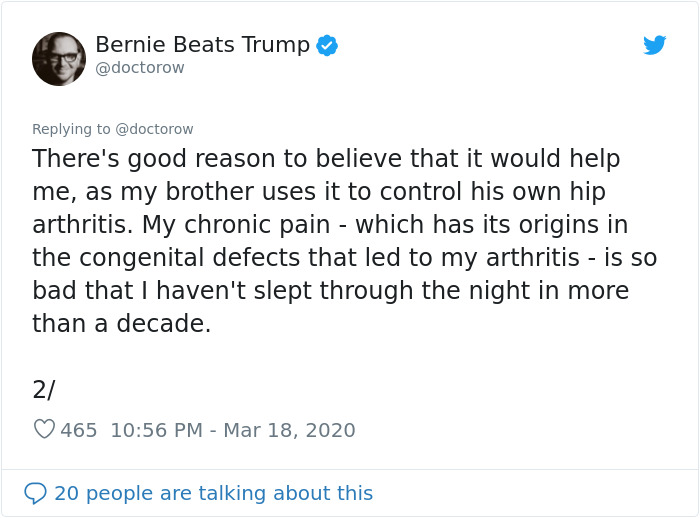
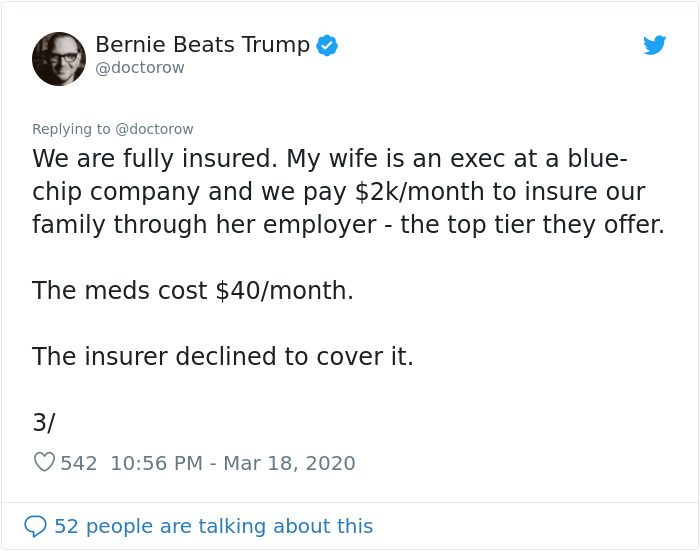
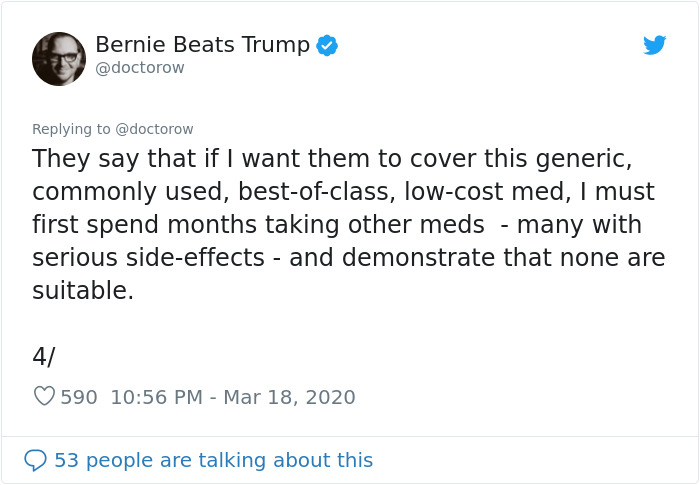
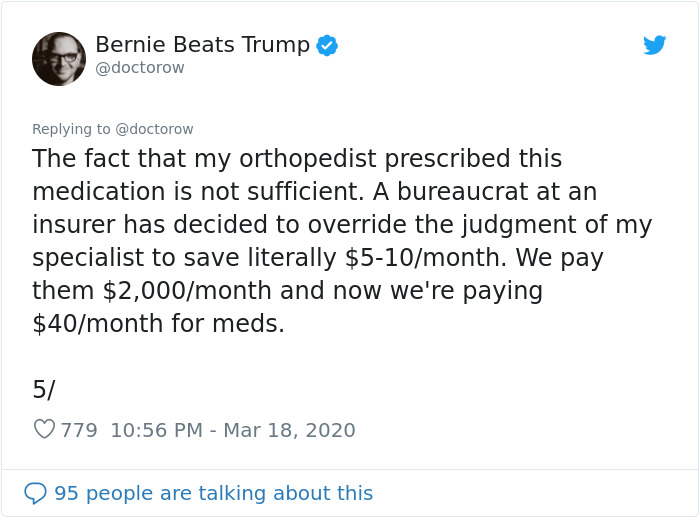
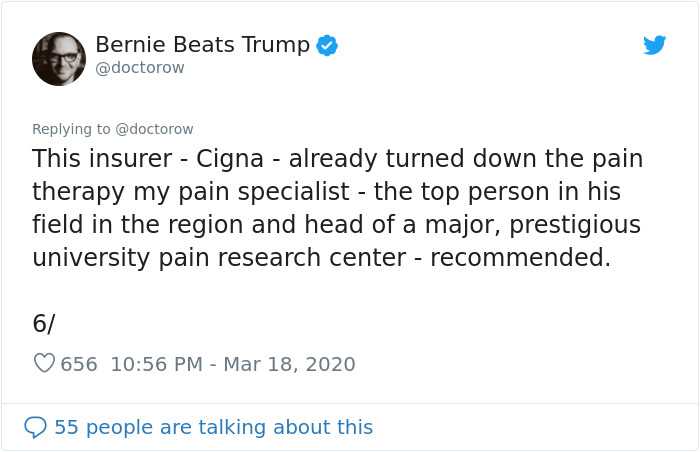
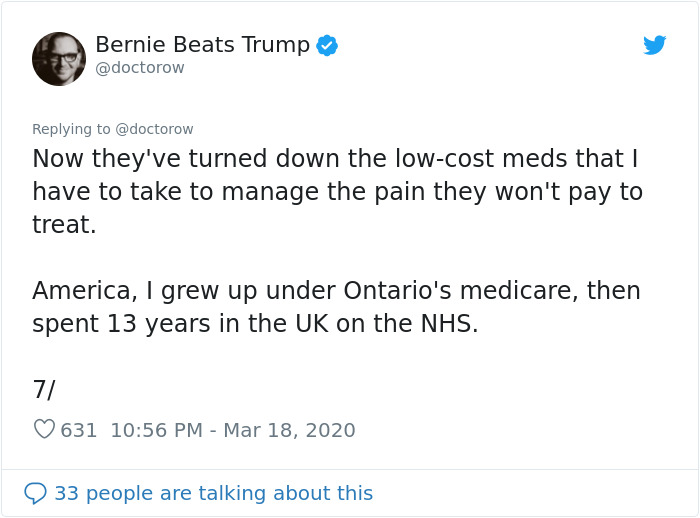
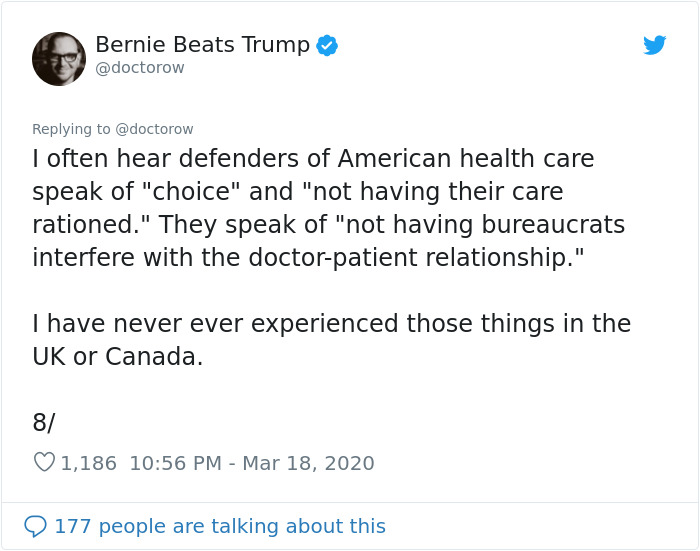
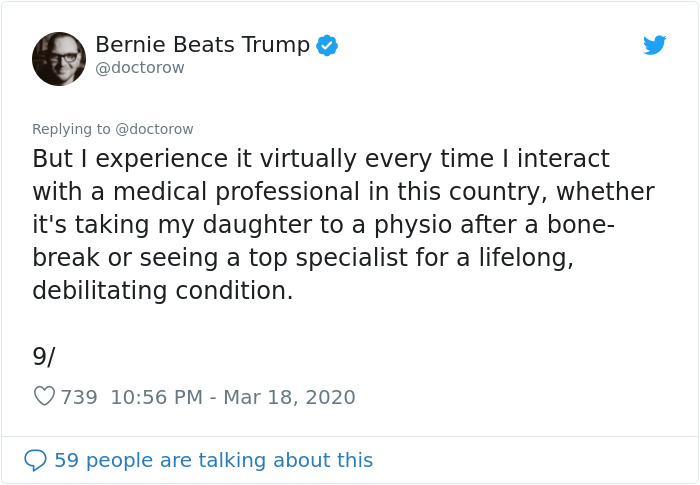
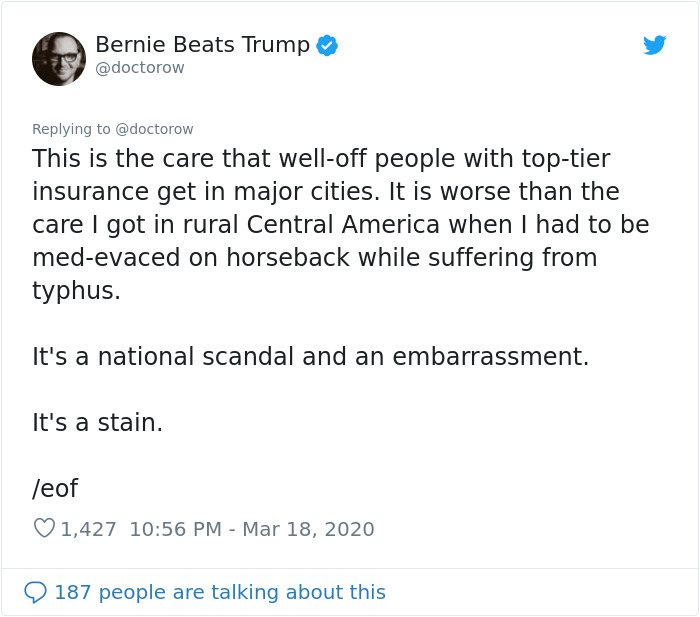
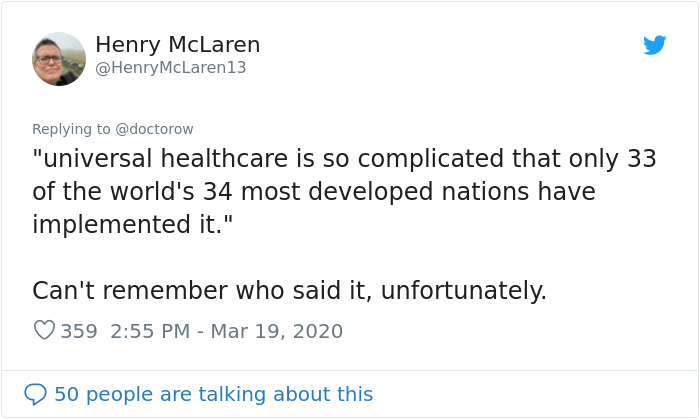
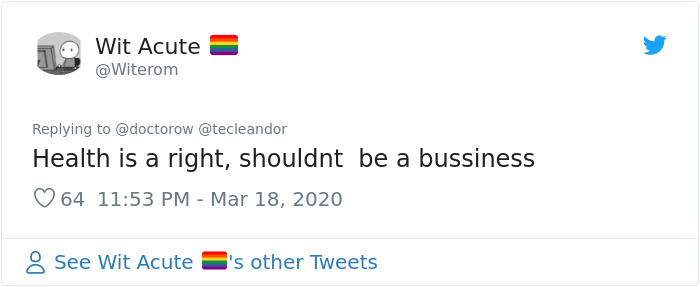
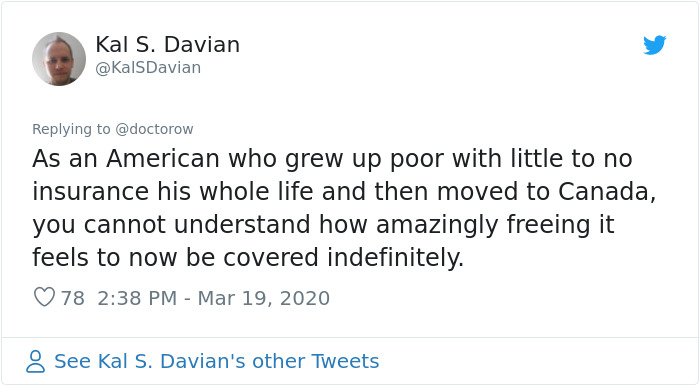
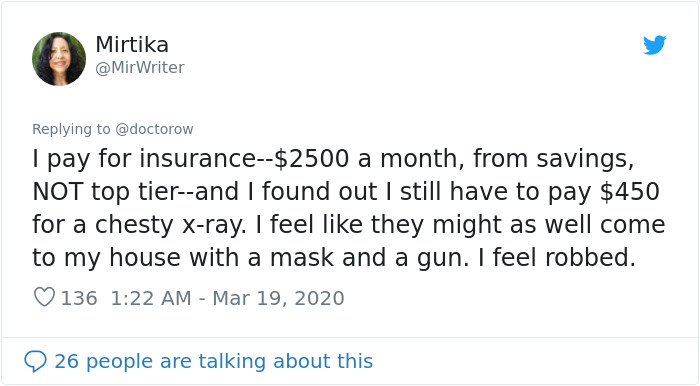
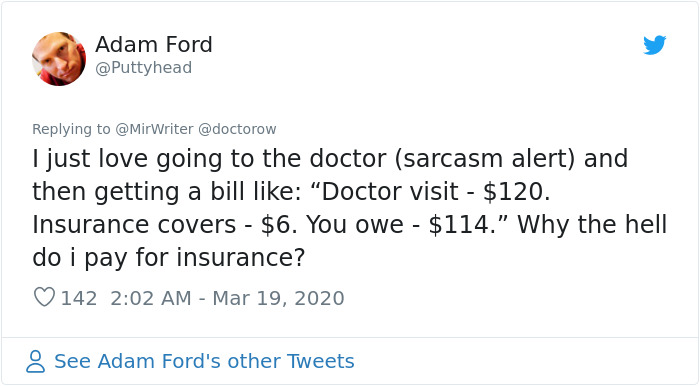
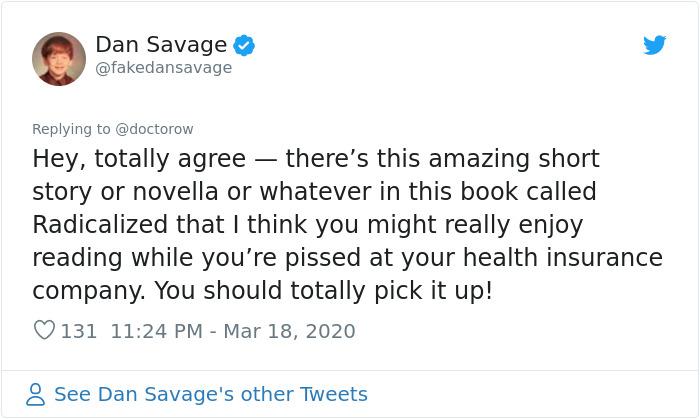
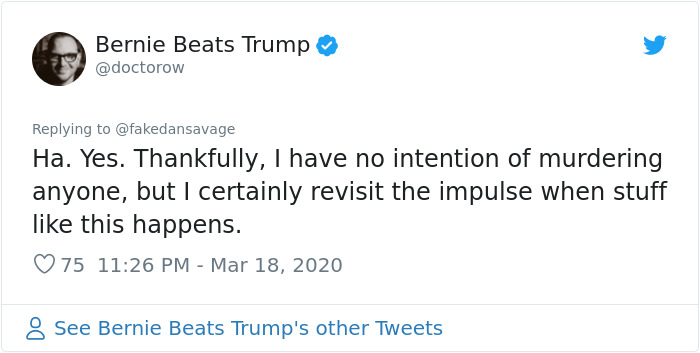
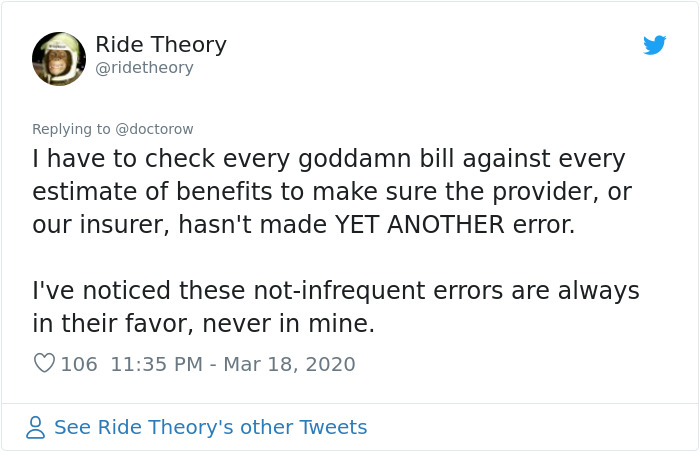




148
75